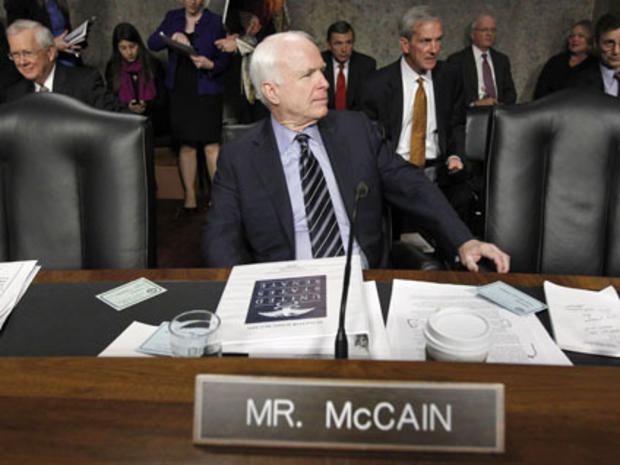McCain: Pentagon's "Don't Ask, Don't Tell" Study Asked the Wrong Question
Sen. John McCain (R-Ariz.) today warned against moving too quickly to repeal the military's ban on gays and lesbians serving openly, arguing that Pentagon's report on the impact of repealing the "don't ask, don't tell" policy asked the wrong question.
The Pentagon report released this week, which surveyed members from every branch of the military, concluded that allowing gays to serve openly would not have long-lasting negative consequences on the military.
At a hearing of the Senate Armed Services Committee today, McCain said that it was clear that the military could successfully implement the repeal of "don't ask, don't tell" if it were asked to do so. However, he said that was not the question at hand.
"What I want to know and what it is that Congress' duty to determine is not can our armed forces implement a repeal of this law, but whether the law should be repealed," McCain said. "Unfortunately, that key issue was not the focus of this study. It is, however, the fundamental question that must be answered by Congress -- not by the president or the courts, but by Congress."
What's Next in "Don't Ask, Don't Tell" Fight?
He continued, "And it is a question that must be answered carefully, deliberately and with proper consideration for the complexity of the issue and the gravity of the potential consequences for our military and the wars in which we are engaged."
McCain had a number of other criticisms of the study. While it may not answer the question Congress is tasked with addressing, McCain said the results were nevertheless consequential. Yet he and his staff have just had 36 hours to review it so far, he said.
On top of that, McCain and other senators said they were concerned that only 28 percent of the military personnel who were sent the "don't ask" questionnaire returned it, representing just 6 percent of the armed forces at large. Army Gen. Carter F. Ham, one of the leaders of the Pentagon study, told the senators that the results were "well within the historical range of DOD surveys of department personnel" and that each category of questions had a statistically significant number of responses.
McCain said he found it hard to consider the report fully representative of personnel views but added, "I am nonetheless weighing the contents of this report on their merits."
"These views should not be considered lightly, especially considering how much combat our force is facing," McCain said.
The survey found that personnel who reported having worked with a gay service member were much more comfortable with the repeal. Of those servicemembers, 92 percent said their unit's ability to work together was not negatively affected by their colleagues' homosexuality.
Defense Secretary Robert Gates told the senators that "with proper time for preparation" and "if we are allowed to do this on our terms, I believe those concerns can be mitigated."
Sen. Joe Lieberman (I-Conn.) argued in defense of the repeal.
"The U.S. military has a proud tradition of leading in reflecting the best values of America," he said. "In this case, I think the military is behind the people and behind the private sector. The law constrains you from reflecting our best values."
Joint Chiefs of Staff Chairman Mike Mullen agreed, "We're an institution that values integrity and then asks other people to join us, fight with us, work with us, and die with us, and then lie about who they are."
McCain said, "I hope that everyone will recognize that this debate is focused on our military and its effectiveness, not on broader social issues being debated in our society at large."
He added that he does not necessarily think the law should never change but that it may be premature to change the law at this time without further debate.
Watch McCain express his reservations today:
Stephanie Condon is a political reporter for CBSNews.com. You can read more of her posts here. Follow Hotsheet on Facebook and Twitter.

